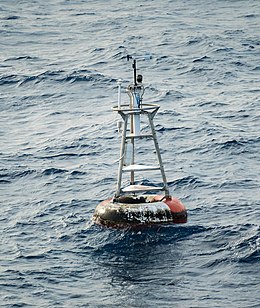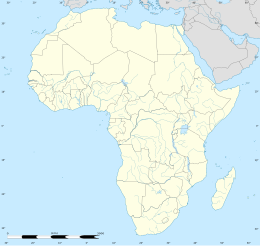Null Island
 The weather buoy moored at the coordinates of Null Island, in the Gulf of Guinea at 0°N 0°E | |
| Geography | |
|---|---|
| Coordinates | 0°N 0°E / 0°N 0°E |
Null Island is the location at zero degrees latitude and zero degrees longitude (0°N 0°E / 0°N 0°E), i.e., where the prime meridian and the equator intersect. Since there is no landmass located at these coordinates, it is not an actual island. The name is often used in mapping software as a placeholder to help find and correct database entries that have erroneously been assigned the coordinates 0,0. Although "Null Island" started as a joke within the geospatial community, it has become a useful means of addressing a recurring issue in geographic information science.[1]
Physical location
[edit]The point on the Earth's surface defined as Null Island is located in international waters in the Atlantic Ocean, roughly 600 kilometres (370 mi) off the coast of West Africa, in the Gulf of Guinea.[2] A weather buoy, named the Soul buoy after the soul music genre, was moored at the location.[3]
The nearest land to Null Island is a small islet 570 km (354 mi; 307.8 nmi) to the north (4°45′30″N 1°58′33″W / 4.75833°N 1.97583°W) that is part of Ghana. The nearest point on the mainland is Achowa Point[4] between Akwidaa and Dixcove, both in Ghana.
The depth of the seabed beneath the Soul buoy is around 4,940 metres (16,210 ft).[5][6]
In software
[edit]In terms of computing and placename databases, the coordinates for Null Island were added to the Natural Earth public domain map dataset[7][8][9] c. 2010–2011, after which the term came into wide use (although there is evidence of it being used previously).[10][user-generated source] Since then, the "island" has, through fiction, been given a geography, history, and flag.[2] Natural Earth describes the entity as a "1 meter square island" with "scale rank 100, indicating it should never be shown in mapping".[7] The name "Null" refers to the two zero coordinates, as null values (indicating an absence of data) are often coerced to a value of 0 when converted to an integer context or "no-nulls allowed" context.
The location is used by mapping systems to trap errors.[8] Such errors arise, for example, where an image artifact is erroneously associated to the location by software which cannot attribute a geoposition, and instead associates a latitude and longitude of "Null,Null" or "0,0".[11] As reported in January 2018 by Bellingcat, other data mapped to the location include activity events from the Strava fitness-tracking app, apparently mapped to the location due to users entering "0,0" coordinates to disguise their real locations.[12]
Soul buoy
[edit]The buoy ("Station 13010 – Soul") was part of the PIRATA system, a set of 17 buoys installed in the tropical Atlantic Ocean since 1997 by the United States, France, and Brazil.[13] Like the other buoys in the system, it was named after a musical genre.[3] It was an Autonomous Temperature Line Acquisition System (ATLAS) buoy that was conical in shape and 3.8 metres (12 ft) high. It was anchored by a cable to the seabed.[6]
The buoy disappeared less than a year after its installation, and was replaced in 1998.[3] The buoy was decommissioned in March 2021.[14][15]
See also
[edit]- Colonel Bleep – a 1957 animated cartoon that took place on the fictitious "Zero Zero Island" (i.e., Null Island), where Earth's equator meets the Greenwich Meridian
- Latitude Zero – a 1969 movie about a fictional utopia that is placed at coordinates 0,0 on the bottom of the Gulf of Guinea
- MaxMind, an Internet geolocation company that by default set 600 million IP addresses to a farmhouse in Kansas
- Point Nemo, the oceanic Pole of inaccessibility
- Royal Observatory, Greenwich – located due north of Null Island
References
[edit]- ^ Juhasz, Levente; Mooney, Peter (2022). ""I Think i Discovered a Military Base in the Middle of the Ocean"—Null Island, the Most Real of Fictional Places". IEEE Access. 10: 84147–84165. arXiv:2204.08383. Bibcode:2022IEEEA..1084147J. doi:10.1109/ACCESS.2022.3197222. ISSN 2169-3536.
- ^ a b St. Onge, Tim (22 April 2016). "The Geographical Oddity of Null Island". Library of Congress. Archived from the original on 12 May 2016. Retrieved 13 May 2016.
- ^ a b c Huet, Sylvestre (1 December 1998). "Après le Pacifique, l'Atlantique équipé de bouées de surveillance". Libération (in French).
- ^ Map of the Gold Coast Colony and neighbouring territories (Map). London: War Office, Intelligence Division. IDWO 1097 – via Georeferencer.
- ^ Jacobs, Frank (March 25, 2022). "Welcome to Null Island, where lost data goes to die". Big Think. Archived from the original on 2022-12-09. Retrieved 2022-12-13.
- ^ a b "Bathymetric Data Viewer" (Survey map). National Geophysical Data Center. National Oceanic and Atmospheric Administration. Retrieved 4 August 2022.
- ^ a b Kurgan, Laura (2013). Close Up at a Distance: Mapping, Technology and Politics. New York: Zone Books. p. 157. ISBN 9781935408284.
- ^ a b Vaughn Kelso, Nathaniel; Patterson, Tom (31 January 2011). "Natural Earth version 1.3 release notes". Natural Earth. Archived from the original on 4 October 2013. Retrieved 1 October 2013.
- ^ Hotz, Robert Lee (14 July 2016). "If You Can't Follow Directions, You'll End Up on Null Island". Wall Street Journal. Archived from the original on 13 July 2016. Retrieved 14 July 2016.
- ^ Currie, Chris [@chriscurrie] (18 April 2009). "@braz we call that spot "Null Island." http://tr.im/j5nI It's at Lat 0, Lon 0" (Tweet). Archived from the original on 10 September 2018. Retrieved 4 August 2022 – via Twitter.
- ^ St. Onge, Tim (9 May 2016). "Null Island is One of the Most Visited Places on Earth. Too Bad It Doesn't Exist". Atlas Obscura. Archived from the original on 25 August 2017. Retrieved 4 August 2022.
- ^ Aric, Toler (29 January 2018). "How to Use and Interpret Data from Strava's Activity Map". Bellingcat. Retrieved 2 February 2018.
- ^ "Station 13010 - Soul". National Data Buoy Center. Retrieved 15 May 2020.
- ^ "WMO Numbers". NOAA. Retrieved 31 July 2024.
- ^ "Status of PIRATA T-Flex Implementation". NOAA. Retrieved 31 July 2024.


 French
French Deutsch
Deutsch